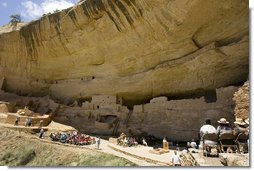
"I'm delighted to be here on this very, very special celebration for Mesa Verde, the 100th Anniversary of Mesa Verde as a national park. Amid these centuries-old dwellings, we're reminded of Mesa Verde's special place in our national park system. Many of our parks offer awe-inspiring landscapes or iconic structures, but visitors to Mesa Verde have a unique opportunity to enjoy both. Mesa Verde is actually the first national park that was established to protect America's man-made treasures, and thanks to a century of custodianship by Mesa Verde rangers, God's creation and man's will be enjoyed here for centuries to come. Congratulations to all of you.
"I'm happy today to have the opportunity to explore a few of Mesa Verde's more than 4,000 archeological sites, including some of the famous cliff dwellings. These sites reflect the culture of this region's ancient inhabitants, tracing their progression from basket weavers, to pottery makers, to farmers, to urban planners, who developed some of America's earliest communities.
"These dwellings also show us the connection between the ancestral pueblo people and their descendents who live in the Southwest today. In fact, 24 Native American tribes in this region have an ancestral affiliation with Mesa Verde."
Mesa Verde is a UNESCO World Heritage Site.